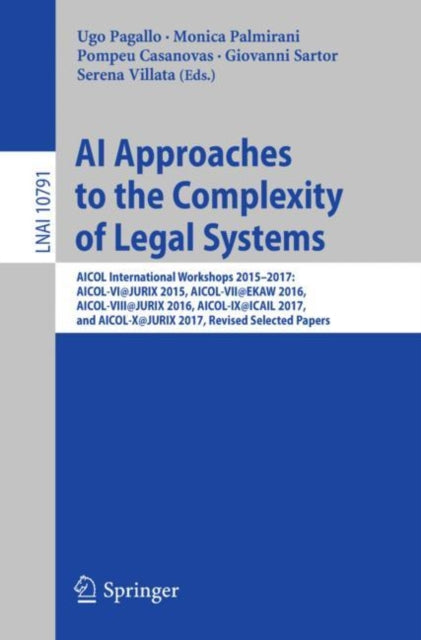Shulph Ink
AI Approaches to the Complexity of Legal Systems: AICOL International Workshops 2015-2017: AICOL-VI@JURIX 2015, AICOL-VII@EKAW 2016, AICOL-VIII@JURIX 2016, AICOL-IX@ICAIL 2017
AI Approaches to the Complexity of Legal Systems: AICOL International Workshops 2015-2017: AICOL-VI@JURIX 2015, AICOL-VII@EKAW 2016, AICOL-VIII@JURIX 2016, AICOL-IX@ICAIL 2017
YOU SAVE £11.69
- Condition: Brand new
- UK Delivery times: Usually arrives within 2 - 3 working days
- UK Shipping: Fee starts at £2.39. Subject to product weight & dimension
Bulk ordering. Want 15 or more copies? Get a personalised quote and bigger discounts. Learn more about bulk orders.
Couldn't load pickup availability
- More about AI Approaches to the Complexity of Legal Systems: AICOL International Workshops 2015-2017: AICOL-VI@JURIX 2015, AICOL-VII@EKAW 2016, AICOL-VIII@JURIX 2016, AICOL-IX@ICAIL 2017
This book presents revised selected papers from five International Workshops on Artificial Intelligence Approaches to the Complexity of Legal Systems, covering topics such as legal philosophy, rules and norms analysis, and legal argumentation. The papers were reviewed and selected from 69 submissions, showcasing the state of the art in legal informatics.
Format: Paperback / softback
Length: 576 pages
Publication date: 23 October 2018
Publisher: Springer Nature Switzerland AG
This book presents a collection of revised selected papers from five international workshops on artificial intelligence approaches to the complexity of legal systems, held from 2015 to 2017. The workshops, namely AICOL VI in Braga, Portugal, AICOL VII at EKAW 2016 in Bologna, Italy, AICOL VIII in Sophia Antipolis, France, AICOL IX at ICAIL 2017 in London, UK, and AICOL X as part of JURIX 2017 in Luxembourg, covered a wide range of topics related to legal informatics.
The 37 revised full papers included in this volume were carefully reviewed and selected from 69 submissions, showcasing the state-of-the-art in legal informatics. The papers are organized into six main sections: legal philosophy, conceptual analysis, and epistemic approaches; rules and norms analysis and representation; legal vocabularies and natural language processing; legal ontologies and semantic annotation; legal argumentation; and courts, adjudication, and dispute resolution.
The first section, legal philosophy, explores the philosophical foundations and implications of legal informatics. It examines questions such as the nature of law, legal reasoning, and the role of AI in legal systems. The second section focuses on conceptual analysis, which involves the study of legal concepts, their relationships, and their representation. It explores techniques such as ontologies, semantic annotation, and machine learning to enhance the understanding and analysis of legal texts.
The third section explores epistemic approaches to legal informatics, which involve the use of AI to enhance legal reasoning and decision-making. It discusses methods such as case-based reasoning, expert systems, and predictive analytics to improve the accuracy and efficiency of legal systems. The fourth section examines rules and norms analysis and representation, which involves the study of legal rules, their interpretation, and their enforcement. It explores techniques such as natural language processing, rule mining, and legal reasoning to automate legal reasoning and decision-making.
The fifth section explores legal vocabularies and natural language processing, which involves the study of legal language and its representation. It explores techniques such as text mining, sentiment analysis, and machine translation to enhance the understanding and analysis of legal texts. The sixth section examines legal ontologies and semantic annotation, which involves the development of structured representations of legal knowledge. It explores techniques such as knowledge representation, reasoning, and inference to facilitate the integration and exchange of legal information.
In conclusion, this book provides a comprehensive overview of the latest developments in legal informatics, covering a wide range of topics and approaches. It is a valuable resource for researchers, practitioners, and policymakers interested in advancing the field of legal informatics.
Weight: 874g
Dimension: 153 x 233 x 43 (mm)
ISBN-13: 9783030001773
Edition number: 1st ed. 2018
This item can be found in:
UK and International shipping information
UK and International shipping information
UK Delivery and returns information:
- Delivery within 2 - 3 days when ordering in the UK.
- Shipping fee for UK customers from £2.39. Fully tracked shipping service available.
- Returns policy: Return within 30 days of receipt for full refund.
International deliveries:
Shulph Ink now ships to Australia, Belgium, Canada, France, Germany, Ireland, Italy, India, Luxembourg Saudi Arabia, Singapore, Spain, Netherlands, New Zealand, United Arab Emirates, United States of America.
- Delivery times: within 5 - 10 days for international orders.
- Shipping fee: charges vary for overseas orders. Only tracked services are available for most international orders. Some countries have untracked shipping options.
- Customs charges: If ordering to addresses outside the United Kingdom, you may or may not incur additional customs and duties fees during local delivery.


